人教版高中英语必修二Unit1Culturalrelics
人教版高一英语必修二Unit 1课文翻译
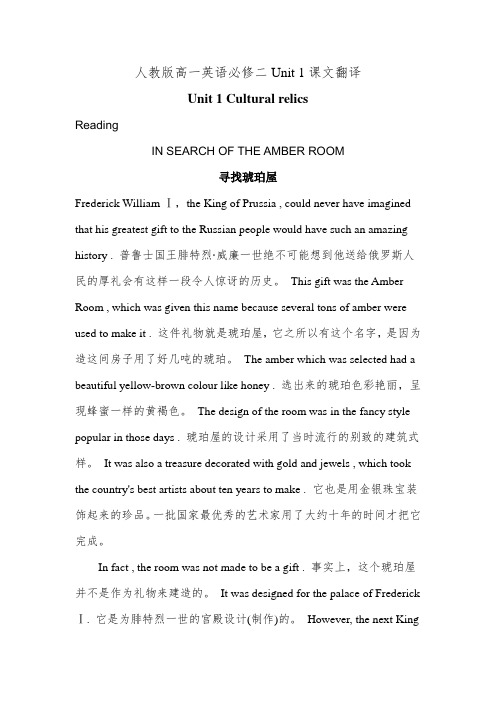
人教版高一英语必修二Unit 1课文翻译Unit 1 Cultural relicsReadingIN SEARCH OF THE AMBER ROOM寻找琥珀屋Frederick William Ⅰ,the King of Prussia , could never have imagined that his greatest gift to the Russian people would have such an amazing history . 普鲁士国王腓特烈·威廉一世绝不可能想到他送给俄罗斯人民的厚礼会有这样一段令人惊讶的历史。
This gift was the Amber Room , which was given this name because several tons of amber were used to make it . 这件礼物就是琥珀屋,它之所以有这个名字,是因为造这间房子用了好几吨的琥珀。
The amber which was selected had a beautiful yellow-brown colour like honey . 选出来的琥珀色彩艳丽,呈现蜂蜜一样的黄褐色。
The design of the room was in the fancy style popular in those days . 琥珀屋的设计采用了当时流行的别致的建筑式样。
It was also a treasure decorated with gold and jewels , which took the country's best artists about ten years to make . 它也是用金银珠宝装饰起来的珍品。
一批国家最优秀的艺术家用了大约十年的时间才把它完成。
In fact , the room was not made to be a gift . 事实上,这个琥珀屋并不是作为礼物来建造的。
高中英语必修二教案

高中英语必修二教案【篇一:人教新课标高一英语必修2_unit_1教案】unit 1cultural relicsi. 单元教学目标ii. 目标语言ii. 教材分析与教材重组1. 教材分析本单元以cultural relics为话题,旨在通过单元教学使学生了解世界文化遗产,学会描述它们的起源,发展和保护等方面的情况,复习并掌握定语从句,能就如何保护和处理世界文化遗产给出自己的观点。
1.1 warming up 热身部分提供了四幅图片,设计了三个问题让学生交流对于cultural relic的了解,并就此进行讨论。
这部分的目的是呈现本单元的中心话题“文化遗产”。
1.2 pre-reading 是reading的热身部分,提供了ambers的图片并就此此设计了两个问题。
这两个问题极易引起学生对amber的兴趣,并能引导学生对课文进行prediction。
1.3 reading是关于寻找丢失了的普鲁士国王威廉一世送给俄罗斯沙皇的那个琥珀房子的建立、转让、被毁、重建的整个历史。
设计这篇文章的目的是让学生了解什么是文化遗产以及讨论保护和重建文化从文化遗产的重要性和必要性。
1.4 comprehending既有知识性的问题,同时又跳出了课文,对文章进行整体评价,由易到难,有较好的梯度,全面考查学生对文章的理解。
exercise 1将人物及相关事件匹配,检验学生对文章细节的理解;exercise 2 将所给的问题与段落匹配,是段落大意理解题;exercise 3安排了对于重建lost cultural relics的意义进行讨论,使得学生能对本单元的主题进行较为深入的探讨。
1.5 learning about language 分discovering useful words and expressions 和discovering useful structures两部分。
其中第一部分的exercise 1着重训练对英语单词解释的理解。
Unit1 Cultural-relics知识与要点-新人教版必修2
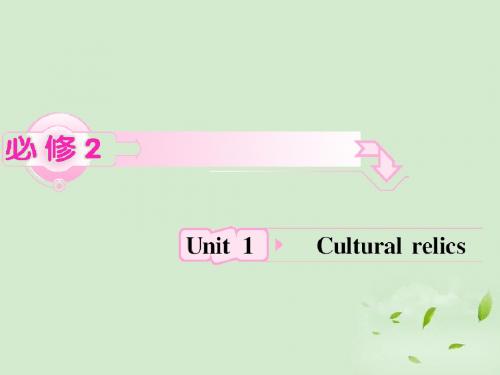
她觉得好像听到身后有脚步声。
Did anything take your fancy? 你看中了什么吗?
温馨提示 fancy用作动词,有时用于祈使句,表示惊奇、不相信、 震惊等,后加名词、代词作宾语,如Fancy meeting you here! 想不到在这儿遇见你!
【链接训练】 He usually appears to be honest.Who can fancy ________ such a thing? A.his do C.his to do B.his doing D.doing
by
5.The broken ship s ank to the bottom of the
6.Rose was doubtful (怀疑) about the whole idea.
7.We have found further scientific evidence (证据) for this theory. 8.You can leave a message with reception (接
有许多古怪的习俗是从早年流传下来的。
归纳拓展 survivor n. 幸存者 survival n.[U] 幸存,存活;[C]过去时代留存下来的人、 物、风俗、信仰等;遗迹;遗风;旧思想 The Poland presidential plane crashed in an area of
dense jungle.There were n林茂密的地区。无人生还。
【链接训练】 ①The firefighter helped the old man ____ the big fire.
A.survive
C.survive in 【解析】 【答案】
Unit 1 Cultural relics(必修二)
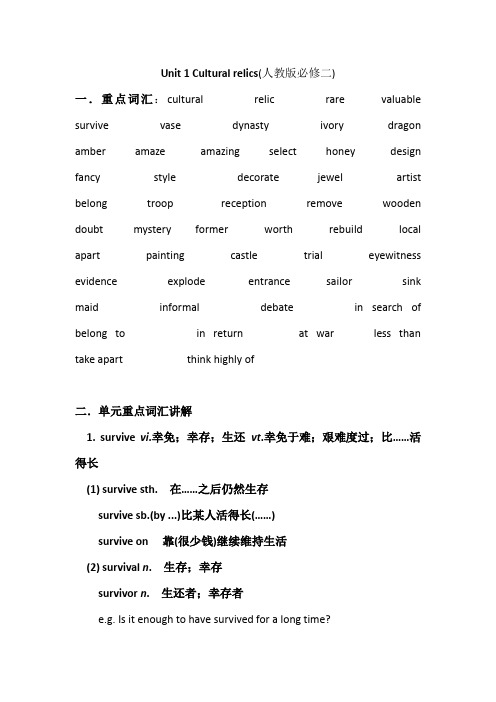
Unit 1 Cultural relics(人教版必修二)一.重点词汇:cultural relic rare valuable survive vase dynasty ivory dragon amber amaze amazing select honey design fancy style decorate jewel artist belong troop reception remove wooden doubt mystery former worth rebuild local apart painting castle trial eyewitness evidence explode entrance sailor sink maid informal debate in search of belong to in return at war less than take apart think highly of二.单元重点词汇讲解1. survive vi.幸免;幸存;生还vt.幸免于难;艰难度过;比……活得长(1) survive sth.在……之后仍然生存survive sb.(by ...)比某人活得长(……)survive on 靠(很少钱)继续维持生活(2) survival n. 生存;幸存survivor n. 生还者;幸存者e.g. Is it enough to have survived for a long time?Some interesting customs have survived from ancient times. 2.amazing adj.令人吃惊的(1) amaze vt.使吃惊;使惊讶(2) amazed adj. 惊奇的;惊讶的be amazed at/by sth. 对……感到惊讶be amazed to do sth. 因做某事而感到惊讶e.g. Frederick William Ⅰ,the King of Prussia, could never have imagined that his greatest gift to the Russian people would have such an amazing history.It was amazing that he knew no-thing about the event. 3.design n.[U,C]设计;图案;构思vt.设计;计划;构思(1) by design =on purpose有意;故意(2) be designed for ... 为……而设计be designed to do sth. 目的是;被设计用于做某事e.g. The design of the room was in the fancy style popular in those days.Can anyone design a better timetable?The programme is designed to help the orphans. 4.decorate v.装饰;装修(1) decorate ... with ... 用……装饰(某物、某处)be decorated with ... 用……来装饰(2) decoration n. 装饰;装饰物e.g. It was also a treasure decorated with gold and jewels, which took the country’s best artists about ten years to make.Decorated with different lights, the living room looks very beautiful.5.remove vt.移动;搬开;脱下;摘掉;开除remove into ...搬入……remove sth. to ... 把某物搬到……remove sb. from ... 从……开除某人e.g. The good news removed all doubts about the company’s future.Please remove your shoes before entering the room when you are in Japan.6.in search of寻找;搜寻in one’s search for寻找……;搜寻……search ... for ... 搜查……;寻找……search for ... 搜寻……;寻找……search sb. 搜身e.g. After graduation, he went to Beijing in search of a job.He turned on his computer in search of the information he wanted.7.belong to属于e.g. However, the next King of Prussia, Frederick William Ⅰ,towhom the amber room belonged, decided not to keep it.As we all know, Taiwan belongs to China.Do you know whom this dictionary belongs to?8.in return作为报答;回报in return for作为对……的报答in turn 依次地;轮流地;反过来;转而e.g. In return, the Czar sent him a troop of his best soldiers.He is always helping people without expecting anything in return.9.at war 在交战;处于交战状态at dawn在黎明;在破晓at work 在上班;在工作at peace 处于和平中;平静at table 在吃饭e.g. This was a time when the two countries were at war.The two countries have been at war for many years. People there are suffering a lot.10.evidence n.[U]根据;证据(1) in evidence可看见的;明显的;显眼的There is some evidence that ... 有证据显示/证明……(2) evident adj. 明显的;明白的It is/was evident that ……很明显e.g. This kind of information is called evidence.We found further scientific evidence for this theory. 11.explode vi.爆炸;(感情)迸发(1)explode with anger勃然大怒explode into laughter突然大笑(2)explosion n.爆裂(声);爆炸(声);迸发e.g. In April 1945 I heard something explode at midnight.At last his anger exploded, but he calmed down after a while. 12.entrance n.入口the entrance to+地点……的入口make an entrance 进入e.g. To my surprise the entrance to the mine was closed.He passed the College Entrance Examination, which made his parents very proud.13.debate n.争论;辩论vi.&vt.争论;辩论(1) have a heated debate进行激烈的辩论under debate在讨论中;在辩论中beyond/without debate无可争议(2) debate sth. with sb.与某人辩论某事e.g. Read the following tips for organizing an informal class debate.After a heated debate, we all agreed on the plan.14.take apart 拆卸;拆开(1) tell ...apart 把……区别开来fall apart 崩溃;土崩瓦解(2) apart from ⎩⎪⎨⎪⎧ 除……以外别无= except 除……之外还有= besidese.g. The old man saw some Germans taking apart the Amber Roomand removing it.How dare you take apart your manager ’s letter?Let ’s take the machine apart and see what ’s wrong with it.15.rather than 与其……倒不如;而不是⎭⎪⎬⎪⎫would do ... rather than do ...would rather do ... than do ...prefer to do ... rather than do ... 宁愿做……也不愿做……e.g. We will have the meeting in the classroom rather than in thegreat hall.In my opinion, he rather than you is to blame.16.think highly of 看重;器重;对……评价高think much/well of ...(= think highly of ...)看重;器重;对……评价高think ill/poorly/badly of 认为……不好think little/nothing of ...轻视;认为……不足为奇e.g. I think highly of those who are searching for the Amber Room.Judging from his expression, he doesn ’t think highly of yourplan.I feel that the boss seems to think highly of you.17. however 与while的区别⑴however意为“然而,可是”,表转折,后又逗号隔开;e.g. I feel a bit tired. However, I can hold on.⑵while意为“然而”,表对比,其后不用逗号隔开。
必修2_Unit_1_Cultural_relics(1)
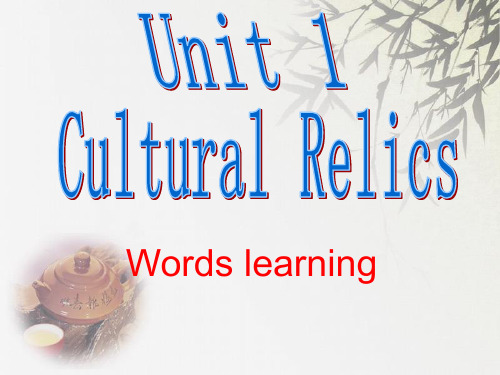
relic n. 遗物;遗风; 遗迹;纪念物。
This ruined bridge is a relic of the civil war.
这座毁坏的桥是南北战争时的遗迹。
This stone axe is a relic of ancient times.
这把石斧是古代的遗物。
take apart拆开
Take the sentence apart and you’ll make its structure clear. 把句子拆开你就会搞清楚它的结构。
Though very young, he was able to take apart the machine skillfully and then put it together without any difficulty. 尽管年轻,但他能娴熟地把机器拆卸开,然后又毫 不费力地组装起来
Your story is several removes from the truth. 你的说法与事实有些距离。
doubt n. 怀疑;疑惑 vt.怀疑;不信 adj. doubtful 可疑的,令人生疑的 adj. Doubtable adj.可疑的, 令人怀疑的
I don’t doubt that he is honest. 我不怀疑他是诚实的。 We doubt if he is honest. 我们怀疑他是否诚实。 There is no doubt that we can finish our task ahead of time 毫无疑问,我们能提前完成任务
She lost all her belongings in the earthquake. 她在地震中失去了所有的财产。
人教版高中【必修二】英语课文原文和翻译
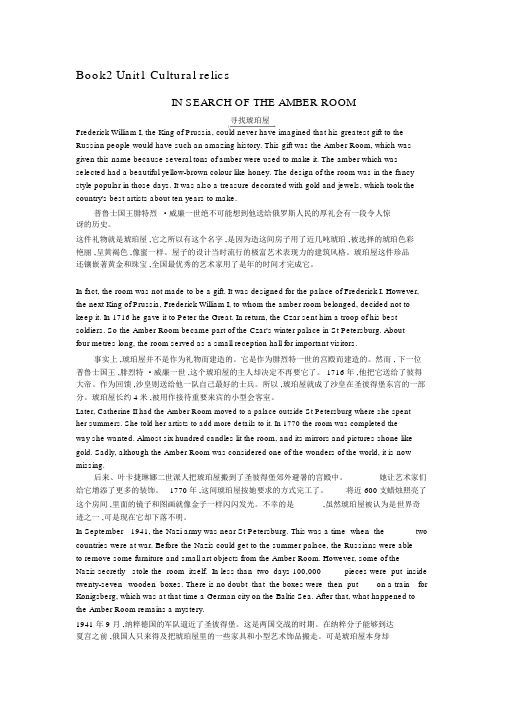
Book2 Unit1 Cultural relicsIN SEARCH OF THE AMBER ROOM寻找琥珀屋Frederick William I, the King of Prussia, could never have imagined that his greatest gift to the Russian people would have such an amazing history. This gift was the Amber Room, which wasgiven this name because several tons of amber were used to make it. The amber which was selected had a beautiful yellow-brown colour like honey. The design of the room was in the fancy style popular in those days. It was also a treasure decorated with gold and jewels, which took the country's best artists about ten years to make.普鲁士国王腓特烈·威廉一世绝不可能想到他送给俄罗斯人民的厚礼会有一段令人惊讶的历史。
这件礼物就是琥珀屋 ,它之所以有这个名字 ,是因为造这间房子用了近几吨琥珀 ,被选择的琥珀色彩艳丽 ,呈黄褐色 ,像蜜一样。
屋子的设计当时流行的极富艺术表现力的建筑风格。
琥珀屋这件珍品还镶嵌著黄金和珠宝 ,全国最优秀的艺术家用了是年的时间才完成它。
In fact, the room was not made to be a gift. It was designed for the palace of Frederick I. However, the next King of Prussia, Frederick William I, to whom the amber room belonged, decided not to keep it. In 1716 he gave it to Peter the Great. In return, the Czar sent him a troop of his best soldiers. So the Amber Room became part of the Czar's winter palace in St Petersburg. Aboutfour metres long, the room served as a small reception hall for important visitors.事实上 ,琥珀屋并不是作为礼物而建造的。
人教版新课标必修2Unit1精讲讲义(附练习答案)

人教版新课标必修2Unit1精讲讲义(附练习答案)Unit 1 Cultural relics知识精讲Ⅰ阅读一、知识点精讲:1. survive v.“幸存,生还”eg: Only 12 of the 140 passengers survived.(1) vi.“生存,存活”eg: I don’t know how you all manage to survive on Jack’s salary.(2) vt.“比(某人)长寿”eg: Harry survived his wife by three months.2. amazing adj. “令人吃惊的”eg: Frederick WilliamⅠ, the King of Prussia, could never have imagined that his greatest gift to the Russian people would have such an amazing history.amaze v.“使大为惊奇”eg: Dave amazed his friends by suddenly getting married.amazed adj.“感到惊奇的”eg: We were amazed at his rapid recovery.3. select (1) vt.“挑选”eg: The amber which was selected hada beautiful yellow-brown colour like honey.(2) adj.“挑选的”eg:The information was only given to a select group of reporters.4. design (1) n.“设计,图案”eg: The design of the room was in the fancy style popular in those days.(2) v.“设计,计划”be designed for…“打算给……用”eg: The coursebooks are designed for the students.be desig ned to do“为了做……而设计”eg: These exercises are designed to develop and strengthen muscles.5. fancy (1) adj.“奇特的,异样的”eg: That is a very fancy pairof shoes!(2) vt.“想象;设想”fancy sth / sb (to be) sth / sb或fancy sth / sb as sth / sb“想象……”eg: I can’t fancy him as (to be) an actor.fancy doing sth“想要,想做”eg: Do you fancy going out this evening?6. decorate v.“装饰,装修”eg: It was also a treasure decorated with gold and jewels, which took the country’s best artists about ten years to make.decorate sth with“用……装饰”eg: We decorated the Christmas trees with tinsel and lights.7. troop (1) n. “群,大群”eg: In return, the Czar sent him a troop of his best soldiers.“军队,部队”(常用复数形式) eg: The troops were drawn up and ready for inspection.(2) v. “成群结队地移动”eg: Children trooped out of s chool.8. reception n. (1) “接待”eg: They gave the Prime Ministera cool reception.(2) “接收;欢迎”eg: Reception of TV programmes is unsatisfactory here.9. wonder (1) n. “奇迹”eg: The Great Wall is one of the wonders in the world.“惊奇,怀疑”eg: The sight of the T aj Mahal filled us with wonder.(2) v.“对……感到惊奇;想知道”eg: Sometimes I wonder about his behaviour.It’s a wonder that…“难得/ 奇怪的是……”It’s no wonder that…“难怪……”wonder at / about“对……感到奇怪/ 惊讶”10. doubt(1) n.“疑问,怀疑”eg: There’s no doubt that hewill win the match.(2) vt. “怀疑,不确信”(在否定句及疑问句中跟that引导的从句) eg: I don’t doubt that he is telling the truth.“怀疑,不确信”(在肯定句中跟whether或if引导的从句) eg: I doubt whether he will come.11. remove vt. (1) “搬开,搬走”eg: Let’s remove the cloth from the table.(2) “开除,免职”eg: The governor was removed from office, pending an investigation.(3) “迁移,移居”eg: They have removed into a new house.(4) “脱掉,摘掉”eg: He removed his hat and gloves.12. in search of (= to look for)“寻找”eg: They all started off at once in search of the missing boy.in search for“寻找”eg: They went out to Australia in search for gold.search for“搜寻,寻找”eg: For a whole day she searched for the missing child.search a place for sth / sb“在某地搜寻某物或某人”eg: We searched the woods for the lost girl13. belong to“属于”eg: The book belongs to you.belong to不用于进行时态和被动语态,但也用belonging to作后置定语eg: The garden belonging to me is large.14. in return“作为报答,作为回赠”eg: She gave us food and clothing and asked for nothing in return.in return for“作为……的回报/ 交换”eg: I’d like to invite youa meal in return for all your hospitality.15. serve as“充当,适合作……用”eg: The old couch had to serve as a guest bed.“担任”eg: Martin served as ambassador to Burma in the1960s.serve in“供职,服兵役”eg: He returned to Greece to serve in the army.16. at war“处于交战状态”eg: This was a time when the two countries were at war.go to war“开战”;declare war“宣战”;fight a war“打仗”17. less than“不到,少于”,它是形容词或副词的比较级结构,修饰名词、形容词、副词或动词,用以加强语气。
人教版英语高中必修二Unit_1__Cultural_relics课件
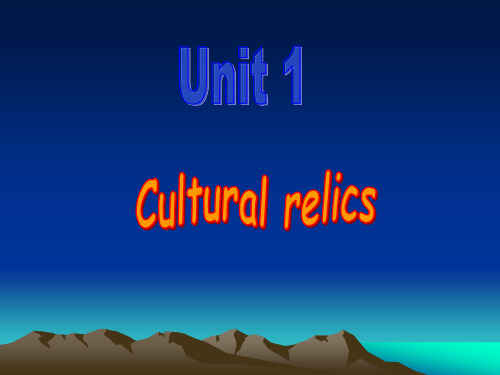
secretly stole the room.
The passage tells the story of the Amber Room in the order of time so that we can clearly know what happened to it.
Join the correct parts of the sentences together.
September 1941?
a troop of his best soldiers
1716
Peter the Great
in return
as a gift of friendship
1770 completed
Amber Room
Catherine II
Nazi
September 1941
Are all the old things cultural relics?
No, not all the old things are cultural relics.
Do you know what material they were made of?
ceramics
ivory
gold
Retell the text according to the following
clues.
In return
was given
served as
1716
was designed for
was rebuilt for
was missing
later was moved… added more… 1770 1941 at war
2 Why did the King of Prussia give the Amber Room to the Czar of Russia as a gift?
- 1、下载文档前请自行甄别文档内容的完整性,平台不提供额外的编辑、内容补充、找答案等附加服务。
- 2、"仅部分预览"的文档,不可在线预览部分如存在完整性等问题,可反馈申请退款(可完整预览的文档不适用该条件!)。
- 3、如文档侵犯您的权益,请联系客服反馈,我们会尽快为您处理(人工客服工作时间:9:00-18:30)。
高中英语学习材料madeofjingetiejiUnit 1 Cultural relics 同步检测第一部分基础测试A. 单词拼写请根据汉语提示或首字母写出单词的正确形式1. The ________ (花瓶) belong to the Ming Dynasty.2. The Great Wall is one of the ___________ (奇迹) of the world.3. We are going to buy some __________ (家具) for our new house.4. You shouldn’t _________ (假装) to know what you don’t’ know.5. I don’t like the colour of the car. ___________ (而且), it’s too expensive.6. Train fares are likely to r________ unchanged. We can still buy cheap tickets.7. These houses are made of bricks and s_________.8. When h_________, the amber can be made into any shape.9. The family j_______ are locked in a safe.10.We should do everything we can to protect c__________ relics instead of destroying them.B. 句型转换根据A句句义,用本单元所学的句型或短语完成B 句,使其句义相同或相近。
11. A: Once heated, the amber can be made into any shape.B: Once ______ ______ heated, the amber can be made into any shape.12. A: It took a team of the country’s artists ten years to make it.B: A team of the country’s artists _______ ten years _____ _____ it.13. A: I don’t know what he’s doing. I don’t care, either.B: I don’t know what he’s doing. _____ _____ I care.14. A: She went into the kitchen to look for a drink.B: She went into the kitchen in ________ ________ a drink.15. A: This dictionary is very useful in our English study.B: This dictionary is _____ ______ _____ in our English study.C. 完成句子16. We can give them something _____ _______ _________ (作为回报) their help.17. This kind of wood can _____ ______ ______ (制成) fine paper.18. The child is lost in the mountain. The police ______ _______ the mountain ______ (寻找) him.19. I don’t know what he’s doing. _________ __________ ________ _________ (我也不关心).20. He ________ ________ ________ (不可能去) to Beijing last night. I saw him just now.第二部分英语知识运用第一节单项填空21.— Why do you look sad?— There are so many problems _____.A. remaining to settleB. remained settlingC. remaining to be settledD. remained to be settled22. Three students in ten will go and _____ to stay in the classroom.A. the rest areB. the rest isC. the other areD. the other is23.— The English exam is not difficult, is it?—____________. Even Tom _____ to the top students failed in it.A. Yes; who is belongingB. No; who is belongedC. Yes; who belongsD. No; who is belonging24. They were thirsty, so they went ______ something to drink.A. looked forB. in search forC. foundD. in search of25. When first _____ to the market, these products enjoyed great success.A. introducingB. introducedC. introduceD. being introduced26. This decision (决定) was due to (由于)_________ you wouldn’t get everything ready on time.A. thatB. the doubt thatC. the doubt whichD. the doubt of27. —Is this the computer you _______ last week?—That’s it.A. had it repairedB. repaired itC. had repairedD. had repair28. In the 1930s, the two countries were at ______ war, and his father was fighting at _____ front.A. the; 不填B. 不填; theC. the; theD. 不填;不填29. The boss ______ the worker how to do it, or the accident couldn’t have happened.A. can’t have toldB. ought to tellC. could have toldD. mustn’t have told30. The paper _____ bamboo is made is especially fine.A. whichB. into whichC. of whichD. from which31. (2004年全国I 35) I don’t mind picking up your things from the store. ______, the walk will do me good.A. Sooner or laterB. StillC. In timeD. Besides32. _________ than a century ago ________ of the things we’re doing now were thought of impossible.A. Less; manyB. More; muchC. Fewer; fewD. Longer; more33. We always ______ Jack an honest man and we ______ him as a good friend of ours.A. look upon; considerB. regard; considerC. consider; regardD. look on; regard34. She pretended _______ me when I passed by.A. not to seeB. not seeingC. to not seeD. having not seen35. We tried to _______ his doubts and let him tell the truth.A. replaceB. reviewC. removeD. rebuild第二节完形填空阅读下面短文,掌握大意,然后从36-55各题所给的四个选项(A、B、C和D)中,选出最佳答案。
It took George quite a while to find a 36 place for his car and in the end he had to leave it in a narrow street, 37 from the dentist’s. As he got out, he glanced at his 38 . His appointment(约会)was at five and he still had twenty minutes to 39 . He crossed into thesquare and 40 on a bench, partly to 41 the last of the afternoon sun, 42 to calm his nerves (神经). He hated these visits 43 the dentist(牙医).As he sat there, watching the children at play and 44 to the old women talking to each other, he turned around to see a red car like his own come out of the 45 where he had parked. The car gathered speed and was soon 46 of sight. George 47 in his pockets for the keys: They were not there. “My car!” he cried 48 a loud voice, which made several people stare at him. He got up and ran across the 49 and then down the narrow street. His car was not to be seen—but then he discovered it concealed(被隐藏)50 a large one. He was relieved (使宽慰)to find his 51 , still in his car.By the time he reached the dentist’s it was already five. “I had rather an odd (奇特的) 52 ,” he said to the dentist to explain his 53 . “I thought my car had been 54 .”“It’s quite55 sir,” said the dentist. “As a matter of fact I have onl y just got here myself.”36. A. leaving B. parking(停车) C. wide D. special37. A. in a way B. far away C. some way D. near38. A. watch B. teeth C. car D. place39. A. leave B. sit C. spare D. see the doctor40. A. stopped B. stepped C. stood D. sat down41. A. shine B. enjoy C. get D. receive42. A. but also B. so C. in order D. for43. A. by B. of C. to D. with44. A. listen B. listening C. to listen D. listened45. A. car B. place C. street D. way46. A. disappeared B. out C. left D. lost47. A. looked B. felt C. found D. searched48. A. with B. at C. in D. by49. A. square B. hospital C. street D. bench50. A. with B. behind C. after D. in51. A. bags B. money C. keys D. card52. A. chance B. luck C. thing D. experience53. A. hateness B. reason C. lateness D. car54. A. robbed B. stolen C. lost D. there55. A. true B. good C. often D. all right第三部分阅读理解阅读下列短文,从每题所给的四个选项(A、B、C或D)中,选出最佳选项ASome time ago I discovered that one of my chairs had a broken leg. I didn’t think there wo uld be any difficulty in getting it mended, as there are a whole lot of antique(古董)shops near my home. So I left home one morning carrying the chair with me. I went into the first shop expecting a friendly reception. I was quite wrong. The man wouldn’t eve n look at my chair.The second shop, though slightly more polite, was just the same, and the third and the fourth—so I decided that my approach must be wrong.I entered the fifth shop with a plan in my mind. I placed the chair on the floor and said to the shopkeeper, “Would you like to buy a chair?” “Twenty pounds,” I said. “OK,” he said. “I’ll give you twenty pounds.” “It’s got a slightly broken leg,” I said. “Yes, I saw that. It’s nothing.”Everything was going according to the plan and I was getting exci ted. “What will you do with it?” I asked. “Oh, it will be easy to sell once the repair is done.” “I’ll buy it,” I said. “What do you mean? You’ve just sold it to me,” he said. “Yes, I know but I’ve changed my mind. I am sorry. I’ll give you twenty-seven po unds for it.” “You must be crazy,” he said. Then, suddenly the penny dropped. “I know what you want. You want me to repair your chair.” “You’re right,” I said. “And what would you have done if I had walked in and said, ‘Would you mend this chair for me?’” “I wouldn’t have agreed to do it,” he said. “We don’t do repairs, not enough money in it and too much trouble. But I’ll mend this for you. Shall we say for a fiver?” He was a very nice man and was greatly amused by the whole thing.56. We can learn from the text that in the first shop the writer .A. was rather impoliteB. was warmly receivedC. asked the shopkeeper to buy his chairD. asked the shopkeeper to repair his chair57. The underlined word “approach” in the second paragraph means .A. plan for dealing with thingsB. decision to sell tingsC. idea of repairing thingsD. way of doing things58. The expression “the penny dropped” in the last paragraph means the shopkeeper .A. changed his mindB. accepted the offerC. saw the writer’s purposeD. decided to help the writer59. How much did the writer pay?A. £5.B. £7.C. £20.D. £27.60. From the text, we can learn that the writer was .A. honestB. carefulC. smartD. funnyBDear Lan Lan,I’m now writing to you at Hartsop, a village in the Lake District, a place to have most beautiful scenery(景色)in English couple here to spend Christmas with them. This was planned for overseas students to know British way of life by living with British families.We came two days before Christmas and during our stay, we have had everything we expected. Christmas turkey, Christmas cake, Christmas puddings, Christmas parties and Christmas gifts under the Christmas tree. All are exciting and amusing(有趣的), but above all these, we are deeply touched by the hospitality(好客)of the family, Roger and Anne Marie.Anne Marie was a nurse and all these days, she had been busy cooking meals, washing dishes and showing us around. Roger, who was a doctor, knows a lot about China and still wants to know more. He plays us Chinese music and it seems to me he does better in that than we do. In the evenings, we all sit around the fireplace with Tim, a lovely dog, by our side. Like long-time-no-see friends, we talk about all the things that have happened or we hope to happen in our lives. There is always so much to tell and to know.After three months away from home, we are again feeling how sweet a home can be. Roger and Anne Marrie are not like most of the other people we have met who always make us feel we are foreigners in a foreign country. They show such kindness to us that they bring us a person-to-person feeling, instead of a British-to-Chinese feeling. They make us believe that though there are differences of languages and cultures, one may always expect to find in every corner of the world the feeling of love and being loved.How I wish Mum and Dad could meet them! How I wish you were here with me! Howstrange it is that the more I feel at home here, the more I miss my real home and all of you. We always talk about “when we go back home next year…” and soon we will turn this into “when we go back home THIS year…” for the New Year’s Day is coming. Miss you.Love Cao Wen61. The writer is now in England.A. a Chinese visitor to an English familyB. a Chinese student studyingC. a Chinese teacher workingD. a Chinese student living62. In Hartsop, Cao Wen felt .A. rather at homeB. the English home better than her homeC. she was a foreigner in a foreign countryD. she was one member of the family63. It seems that Roger .A. can speak Chinese very wellB. knows something about Chinese for a long timeC. once lived in China for a long timeD. can do everything better than the Chinese64. When you are away from home, it is good for you to have the feeling .A. of being aloneB. of going home soonC. of love and being lovedD. as a foreigner65. In the writer’s opinion, the best home is .A. the home they stayed in EnglandB. the home that you left behindC. Chinese homeD. one’s own homeCThe Taj Mahal (泰姬陵) is considered to be one of the most beautiful buildings in the world and the finest example of the late style of Indian architecture (建筑). It is at Agra in northern India. It lies beside the River Jumna in the middle of gardens with quiet pools.The Taj Mahal was built by the Mogul emperor (皇帝) Shah Jehan, who ruled India in the seventeenth century. It is in memory of his favorite wife, Arjumand Banu Bagam, known as Mumtaz Mahal, who died in 1631. The building, which was completed between 1632 and 1638, was designed by a local Muslim architect (建筑师), Ustad Ahmad Lahori. The whole building, with gardens and gateway structures, was completed in 1643. The Taj Mahal stands at one end of the garden tomb with marble (大理石) path. The room is softly lighted by the light that passes through double screens of carved marble set high in the walls. The building now is kept in good condition.The Taj Mahal took 22 years to build. Shah Jehan planned a similar building, but in black instead of white, to lie on the other side of the river. But before it could be built, Shah Jehan was imprisoned (监禁) by his son and buried next to his wife in the Taj Mahal.66. The Taj Mahal was built for____ .A. MumtazB. ShahC. Either Mumtaz or ShahD. Both Mumtaz and Shah67. Why do you think Shah Jehan was buried next to his wife?A. His own tomb hadn't been built.B. He hoped to be buried there.C. King and Queen should be buried together.D. He liked Mumtaz all his life.68. The passage mainly tells us____ .A. why the Taj Mahal was builtB. the love story between Shah and MumtazC. some information about the Taj MahalD. the Taj Mahal—the pride of Indians69. Form the passage we can learn that____ .A. the Taj Mahal looks more beautiful than before.B. the Taj Mahal doesn't exist now.C. the Taj Mahal has completely changed.D. the Taj Mahal has become a place of interest.第四部分阅读表达阅读下面短文,然后根据文章后的题目要求进行简答。
